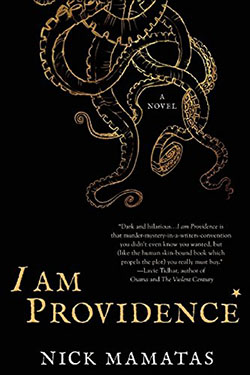Ahead of Ian McEwan’s literary nasty Nutshell, a fable of infidelity readers will only be able to experience from the perspective of a foetus, I Am Providence proffers a murder mystery narrated in no small part by the victim of that very vicious killing in the moments before his failing brain cracks and crumbles like “a sponge drying in the sun.”
Panos Panossian is an utterly insufferable author of Lovecraftian lore, so it’s either fitting or simply suspicious that he meets his maker on the first day of the annual Summer Tentacular. “Providence’s premiere literary conference about pulp-writer, racist, and weirdo Howard Phillips Lovecraft” features, funnily enough, “a veritable ‘Who’s That?’ of horror fiction,” including one Colleen Danzig. A newcomer to mythos mania with just a few short stories to her name, she was set to share a room with Panossian, but when the con goes on despite his death, Colleen decides to determine just whodunnit. After all, “if anything is possible, then yes, an untrained writer could find a murderer.”
Not just a murderer, but a mutilator too, because to add insult to injury, the killer, whoever he or she may be, purloined poor Panossian’s face in addition to his future.
Singularly sickening as the murder this mystery revolves around is, if the truth be told, there’s no shortage of suspects in Nick Mamatas’ scathing portrayal of Lovecraftian fandom:
The Tentacular was a strangely aggressive environment—writers jockeying for position, people bellowing at one another, men sneering at women out of some abject simultaneous attraction and repulsion. It was high school all over again, except that all the kids with a measure of social intelligence were at the homecoming dance and the kids left behind were the meatheads, glue-sniffers, nerds, and minor league bullies. Geeks who liked to show off their knowledge of esoteric subjects, the more repulsive, the better.
That last—”the more repulsive, the better”—may well have been Mamatas’ mantra whilst working on I Am Providence, because it is, if not a horrid novel, then a novel of horridness. Almost all of its characters are creeps, not least Colleen, who is so cavalier and careless in her pursuit of the truth that she points the finger at pretty much everyone she meets, such that it’s no wonder she hasn’t made a great many friends by the end.
Not that anyone would want friends like these. Other than R. G. and maybe Ms. Phantasia’s acolyte Chloe, the Tentacular’s other attendees don’t read like real people. Rather, they come across as embodiments of the most repellent elements of clique culture. In the way that they treat one another they’re dismissive and demeaning; in the way that they treat outsiders—even the keen ones like Colleen—they’re insular and indignant. No one is nice. No one is welcoming. No one is intelligent or generous or genuine.
A single exception to show that not all con-goers are heinous human beings would have helped me to feel better about what Mamatas seems to be suggesting about speculative fiction fans specifically, but it wasn’t to be, and sadly I Am Providence‘s narrative isn’t any more balanced than its characters. Its pitch-perfect premise and early promise give way to a miserable, meandering thing that feels far longer than it is. Colleen’s cockamamie theories about the crime she resolved to solve are “simultaneously complex and half-baked.” One follows another follows another and then there’s The End.
The best moments in the between times are those in which Mamatas threatens to let a little light into the eldritch darkness. Alas, even his threats are empty. I Am Providence has a sense of humour, but it’s cruel where it could be cutting, and contrived instead of clever. It has all the ingredients necessary for a magnificent murder mystery, but before we’ve even tasted them, they’ve been wasted. It has a host of insightful diatribes on the allure of Lovecraft and the like as indulgences of “the fantasy that there is something beyond death,” but at the last, Mamatas rejects even these:
All the ratiocination the human mind could muster; all the piecing together of disparate documentation from ship captains, from academics, from harried witnesses; the collections of artifacts and ancient codices; even the revelation of ancient cities and alien species; none of it mattered, ultimately. No matter what was discovered through application of logic and reason, it wouldn’t be enough to forestall doom. Cthulhu wasn’t the antagonist of ‘The Call of Cthulhu,’ and the doomed sailor Gustaf Johansen wasn’t the hero. Cthulhu’s eventual rise and the utter destruction of humanity—as an epiphenomenon of some machinations we couldn’t possible comprehend—wasn’t a threat, it was a promise. Like Judgment Day without the Christians, the apocalypse without salvation. No hint of an afterlife either.
Clearly, there are some great ideas in here, but even if you can get past the flat characters and the circumnavigative narrative and the nastiness of the entire enterprise, I Am Providence goes nowhere of note, oh-so-slowly. The finest “Lovecraftian fiction posits a world that is indescribable, incomprehensible, and delicious,” a world that pairs pain with wonder, but there’s nothing wonderful about this, and a dearth of deliciousness.
I am Providence is available now from Night Shade Books.
Niall Alexander is an extra-curricular English teacher who reads and writes about all things weird and wonderful for The Speculative Scotsman, Strange Horizons, and Tor.com. He lives with about a bazillion books, his better half and a certain sleekit wee beastie in the central belt of bonnie Scotland.










